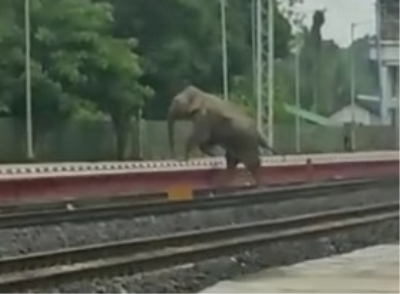Jumbo deaths: Railways develop AI-based software to avoid collisions
To roll out in all elephant corridors
New Delhi, Nov 30 : With an aim of avoiding train-elephant collisions, Railway Minister Ashwini Vaishnaw on Wednesday said that the national transporter has developed an indigenous software named ‘Gajraj’, using optical fibre cable (OFC), to issue warning to the loco pilot about any suspicious movement on or near the rail tracks.
The Minister also said that the AI-based software device has been tested successfully in Assam and will be installed in the 700 km elephant corridors spread in several states within a time period of eight months.
He also said that the entire cost of installation of Gajraj software with its device for the 700 km corridor is estimated at Rs 181 crore.
Explaining how the Gajraj technology system works, the Minister said: “In its AI-based software using OFC, alerts are issued in case any suspicious traffic is detected from the distance of 200 metres from the railway tracks.
“When there is elephant movement on or alongside a railway track, this creates vibration, causing variations in the optical signals being carried in these OFCs. The disturbance in the signals is the signature of a suspected movement. The software detects the changes in the optical signals to sense the presence of elephants.”
Vaishnaw said that this device and software can exactly tell whether the movement is that of an elephant, other animals or even human.
“It can also specifically tell the distance where the movement has been detected. Any mammal which walks on land has a specific movement signature. The AI-based software has been trained to even detect the number of animals at a site,” he said.
He also said that the loco pilot, those in the control room and the section station master receive alerts raised upon detection of any movement.
According to the Railway Ministry data shared in Parliament in July last year, 45 elephants have died in train accidents in the last three years. On Monday, three elephants, including a calf were killed at Rajabhat Khawa in Alipurduar district of West Bengal following a collision with a goods train. The three elephants, a mother and her two babies, died on the spot.
In August this year a pregnant elephant died in West Bengal following a collision with a train.
The MInister said that these AI-powered software devices will be installed in the states of West Bengal, Odisha, Jharkhand, Assam, Kerala and some parts of Chhattisgarh and Tamil Nadu.
The Minister also said that the national transporter ferried 640 crore passengers in last financial year and this year, the number will reach 750 crore. He also refuted the claims that the railways is operating less trains and said: “After the Covid pandemic, the railway services resumed in December 2021 and in July 2022 situation normalised.”
Citing the figures, the Minister said, “Before Covid pandemic, the railway operated 1,768 mail and express trains while now the railways is operating 2,124 mail or express trains on its route.”
He also said that before the Covid pandemic, the railways operated 5,626 suburban train services, while now it is operating 5,774 suburban services. He also said that the railway before the pandemic operated 2,792 passenger train services, which has now gone up with 2,856 train services.
Giving the overall figure, the Minister said, “Before Covid pandemic, railways operated 10,186 trains everyday for passenger transportation, now we are operating 10,754 train services, which is 568 higher.” He also said that of the total 60,000 coaches, about 40,000 coaches in the trains are sleeper coaches and a significant portion is of the non air-conditioned coaches.
The MInister further said capacity building is a major task. “Last year, 5,243 km of new Railway tracks were added in the network and this year we have targeted to cross the mark. We will be anywhere doing 5,500 to 6,000 km of new railway track,” Vaishnaw said.



